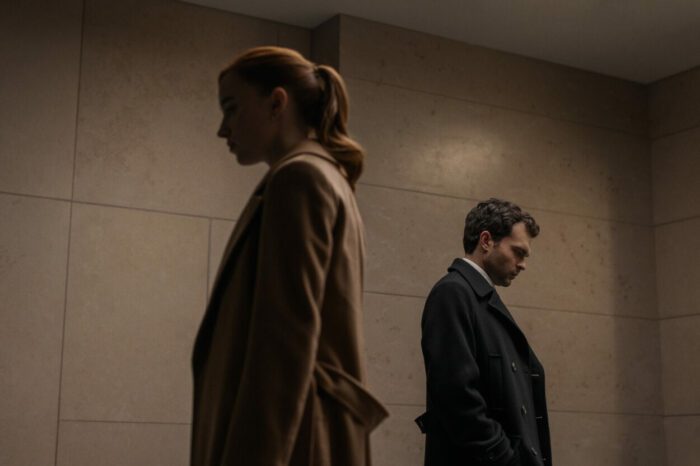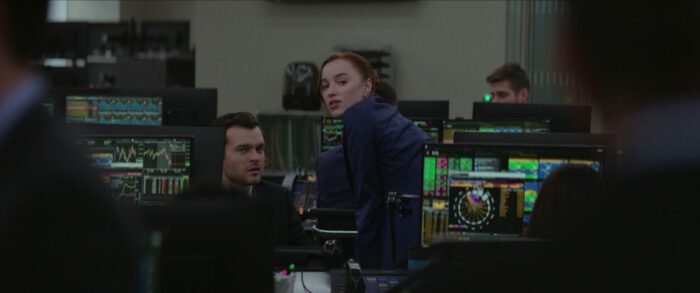One of the staples of cinema from its inception to the mid-2010s was movies for grown-ups. I’m talking about mid-budget films with movie stars that made a lot of money, usually rated R or a very hard PG-13. Here are some worldwide grosses of notable grown-up movies: Basic Instinct $350 million, Se7en $330 million, Jerry Maguire $270 million, The Social Network $220 million. Let me put this into perspective, a 1992 movie about Michael Douglas and Sharon Stone being incredibly hot for one another made more money than this year’s disaster The Flash. We used to be a proper country.
These movies barely exist anymore and when we do get them—TÁR, The Fabelmans, The Banshees of Inisherin, Asteroid City—they don’t make any money. That’s why Oppenheimer making nearly a billion dollars is such a big deal and one hopes Killers of the Flower Moon can build off that success. Chloe Domont’s Sundance sensation Fair Play is a fascinating addition to the grown-up movie genre. In some way, it’s exactly what I’ve been pleading for (young movie stars, very hard R, dealing with mature themes) but going straight to Netflix diminishes some of the impact it could’ve had.
I’ll get into the possible legacy—or lack of it—of Fair Play later, but as for the film itself, it’s a total blast. Twisty and thorny, Domont’s feature debut is a wildly entertaining psychological thriller with two knockout lead performances from Phoebe Dynevor and Alden Ehrenreich.

Secretly dating and soon-to-be-engaged, Emily (Dynevor) and Luke (Ehrenreich) are two ambitious financial analysts working at the same firm. When a promotion becomes available, the pair believes Luke is primed for the position. However, in a shocking turn of events, Emily gets the promotion. Initially supportive, Luke starts to unravel and the couple finds themselves tearing each other apart at this cutthroat hedge fund.
To talk about Fair Play is to talk about the excellent performances of Domont’s leads. This is essentially a two-hander and the movie absolutely rests on Dynevor and Ehrenreich’s shoulders. The supporting cast does not boast big stars and has minimal impact on the narrative. Moreover, both Emily and Luke aren’t written with immense depth. This isn’t to say they’re underwritten but the characters could have used more layers (expected from a first-time writer, something I’m sure Domont’s future screenplays won’t have).
But both these actors are going for it which is exactly what the film needs. By nature, this has to be an over-the-top and melodramatic movie. There have to be outbursts, yelling, and crying, and Dynevor and Ehrenreich are so game for everything. From the opening scene, the duo have so much chemistry with one another. There’s no build-up or world setting, nope. Within five minutes, Emily and Luke sneak into the bathroom at Luke’s brother’s wedding to hook up. Things get hot, heavy, and messy—foreshadowing the rest of this intense movie.
Messy is the keyword here. Through small moments, Domont plants the seeds of destruction and toxicity. While showering together, Emily jokingly says Luke would choose his job over her. Luke laughingly doesn’t deny the statement. Both are laughing but the viewer knows these microaggressions represent something bigger to come. In the beginning, these two are ready to rip each other’s clothes off at any moment. As Emily gets the promotion, all the sexiness goes away and the two turn into seemingly unrecognizable figures.

But are they really unrecognizable? Luke becomes whiny, needy, and self-righteous; Emily’s ambition becomes her sole priority. Initially, you may think this promotion is what caused the pair to transform into borderline sociopaths. However, I think Domont is trying to show their true colors. That, perhaps, Emily and Luke have always been like this and were putting on a show for each other. In stressful situations, we become the worst version of ourselves but Domont argues that these versions are who we truly are as people.
It’s when Luke’s fragile ego shatters and Emily’s unlimited ambition takes centerstage that Fair Play finds itself and becomes a gripping psychological thriller. Before this, it plays mostly like a romantic drama lacking intensity and it probably takes a bit too long for the emotions to be heightened. This is really when the actors really start to cook, channeling some major Marriage Story fighting energy.
Dynevor, of Bridgerton fame, jumps off the screen in blazing fashion. Not having watched Bridgerton, I wasn’t sure what to expect from her but she commands your attention. Her performance is, by nature, quiet and slight in the beginning only to make her turn that much more impactful. Again, it really seems like Domont is showing that we put on a face for the ones we love and it’s incredibly indicative in Dynevor’s smashing performance. She’s an exciting actress who is going to be in a ton of movies.
Ehrenreich—having a terrific 2023—is utterly great in a depraved performance. Luke reminds me of Howard Ratner in Uncut Gems, where everything he says and everything he does makes you immensely stressed as he digs a deeper hole for himself. It is a one-note character in that Luke never really gets more characterization than “insecure guy,” but honestly that didn’t bother me. I had a blast seeing Ehrenreich say scathing line after scathing line to Dynevor, having drunk outbursts, going insane, among other wild things. What I especially loved about his character is that he’s just so bad at his job and doesn’t understand that. He loses the company millions of dollars (multiple times) and still thinks he’s more worthy than Emily. Ehrenreich sells this aspect with perfect conviction.

Fair Play is a very strong debut from Domont. As mentioned before, you can tell this is a debut feature with some shoddy writing/characterization and none of the technical aspects—cinematography, editing, score—will floor you. But, I’m fascinated with her approach to this story of gender dynamics. Domont is absolutely interested in the takedown of the fragile male ego and Fair Play is mostly focused on that. However, she makes it a fact to show that, along with Luke’s internal demise, Emily is sacrificing her morals and ideals. Emily can’t transform the firm to buy into a “the future is female” philosophy. She has to stoop to their level by going to strip clubs and partaking in their fratboy culture. Her boss calls her a “dumb f*cking bitch” at one point and she just takes it. There’s no speech or referendum on how that’s problematic but she happily takes a hefty bonus check as a pseudo-form of apology.
Speaking of the dialogue, Fair Play features some great insults. At one point, Luke tells Emily, “You don’t look like one of the boys. You look like the hooker they play to keep them company.” Again, these people are—theoretically—about to get married and trade killer jab after jab. Another line I could not get enough of was when Emily tells Luke, “I’ll save your career if you eat my p*ssy.” The dialogue is raunchy, trashy, shocking, and cringe-worthy and I devoured every bit of it.
Domont is also unafraid of eventual discourse as the third act truly is bonkers and goes for it. It does feel at times the movie was headed toward an ending three or four times and kept going and I don’t think all of the decisions Domont makes work. You have to appreciate the boldness swinging for the fences but it comes at the risk of going haywire. But, Fair Play lands the plane with a very satisfying ending—something the similar and quite good Sanctuary did not.

I say eventual discourse but also wonder simultaneously if said discourse will occur simply due to the fact this film is going on Netflix. It feels like so many movies from Netflix fall into a black hole and seemingly fade away from any cultural impact. In a pre-Oppenheimer world, I would probably say Fair Play has no shot at the box office. However, the great success of Oppenheimer shows that there is a desire for grown-up movies. Many have bemoaned Richard Linklater’s Hit Man going to Netflix for the same reasons. Both movies feature possible young movie stars, something Hollywood needs so badly. The reality is that Netflix doesn’t create movie stars—only theaters do.
Would Fair Play have made a billion dollars? No, but I like to bet it would have done solid business given the current slate of movies out right now. This is also a movie that works so much better with a crowd because of its young stars, the dialogue, and the bold decisions. It’s a movie you go to with other people and discuss over dinner. That isn’t replicable in your living room on Netflix.
Nonetheless, Fair Play is such an exciting feature despite its imperfections. It’s demented, messed up, and just so much fun. Domont is a name to watch for and Dynevor and Ehrenreich give two movie-star-making performances. A note to studios: make more movies like Fair Play and release them in theaters.



